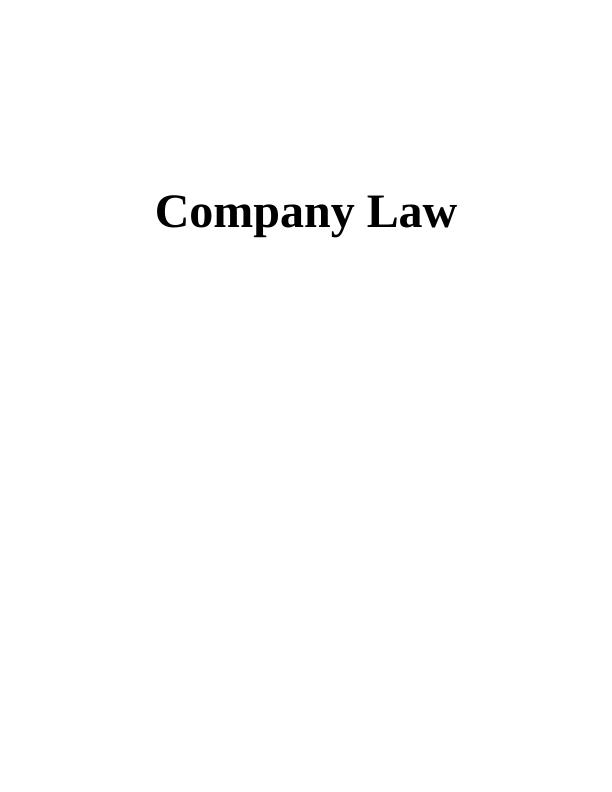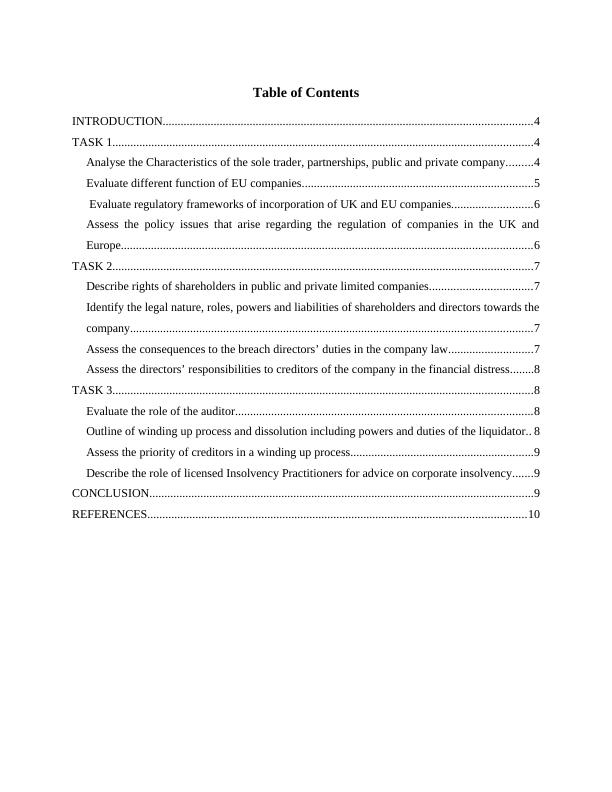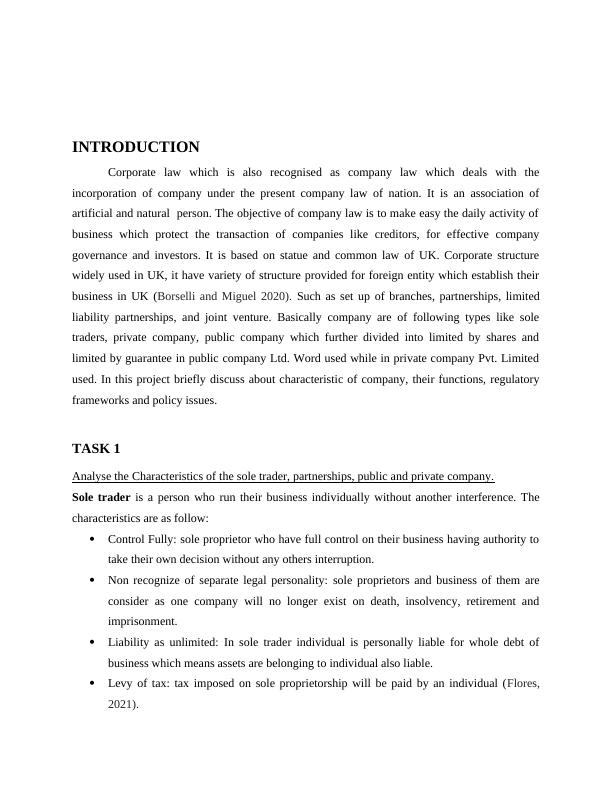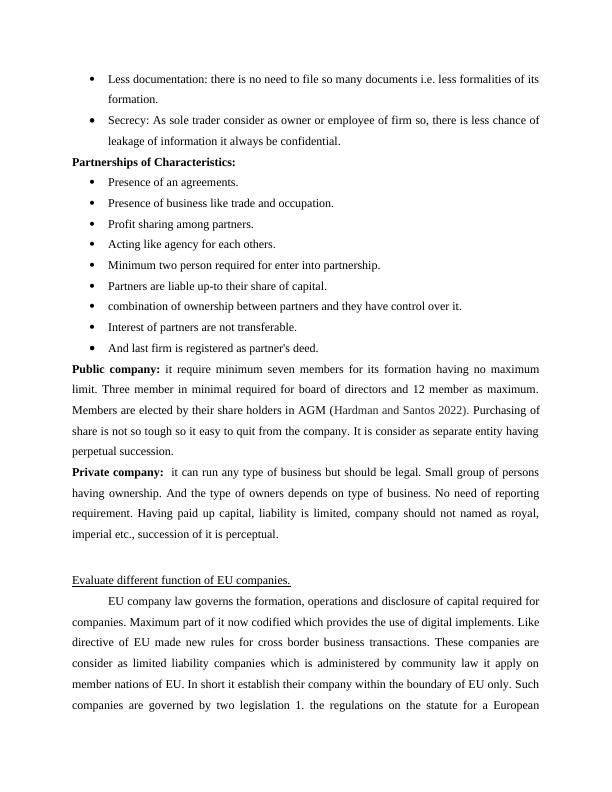Company Law: Characteristics, Functions, Regulatory Frameworks, and Policy Issues
Added on 2023-06-09
12 Pages2775 Words478 Views
Company Law

Table of Contents
INTRODUCTION...........................................................................................................................4
TASK 1............................................................................................................................................4
Analyse the Characteristics of the sole trader, partnerships, public and private company.........4
Evaluate different function of EU companies.............................................................................5
Evaluate regulatory frameworks of incorporation of UK and EU companies...........................6
Assess the policy issues that arise regarding the regulation of companies in the UK and
Europe.........................................................................................................................................6
TASK 2............................................................................................................................................7
Describe rights of shareholders in public and private limited companies..................................7
Identify the legal nature, roles, powers and liabilities of shareholders and directors towards the
company......................................................................................................................................7
Assess the consequences to the breach directors’ duties in the company law............................7
Assess the directors’ responsibilities to creditors of the company in the financial distress........8
TASK 3............................................................................................................................................8
Evaluate the role of the auditor...................................................................................................8
Outline of winding up process and dissolution including powers and duties of the liquidator.. 8
Assess the priority of creditors in a winding up process.............................................................9
Describe the role of licensed Insolvency Practitioners for advice on corporate insolvency.......9
CONCLUSION................................................................................................................................9
REFERENCES..............................................................................................................................10
INTRODUCTION...........................................................................................................................4
TASK 1............................................................................................................................................4
Analyse the Characteristics of the sole trader, partnerships, public and private company.........4
Evaluate different function of EU companies.............................................................................5
Evaluate regulatory frameworks of incorporation of UK and EU companies...........................6
Assess the policy issues that arise regarding the regulation of companies in the UK and
Europe.........................................................................................................................................6
TASK 2............................................................................................................................................7
Describe rights of shareholders in public and private limited companies..................................7
Identify the legal nature, roles, powers and liabilities of shareholders and directors towards the
company......................................................................................................................................7
Assess the consequences to the breach directors’ duties in the company law............................7
Assess the directors’ responsibilities to creditors of the company in the financial distress........8
TASK 3............................................................................................................................................8
Evaluate the role of the auditor...................................................................................................8
Outline of winding up process and dissolution including powers and duties of the liquidator.. 8
Assess the priority of creditors in a winding up process.............................................................9
Describe the role of licensed Insolvency Practitioners for advice on corporate insolvency.......9
CONCLUSION................................................................................................................................9
REFERENCES..............................................................................................................................10

INTRODUCTION
Corporate law which is also recognised as company law which deals with the
incorporation of company under the present company law of nation. It is an association of
artificial and natural person. The objective of company law is to make easy the daily activity of
business which protect the transaction of companies like creditors, for effective company
governance and investors. It is based on statue and common law of UK. Corporate structure
widely used in UK, it have variety of structure provided for foreign entity which establish their
business in UK (Borselli and Miguel 2020). Such as set up of branches, partnerships, limited
liability partnerships, and joint venture. Basically company are of following types like sole
traders, private company, public company which further divided into limited by shares and
limited by guarantee in public company Ltd. Word used while in private company Pvt. Limited
used. In this project briefly discuss about characteristic of company, their functions, regulatory
frameworks and policy issues.
TASK 1
Analyse the Characteristics of the sole trader, partnerships, public and private company.
Sole trader is a person who run their business individually without another interference. The
characteristics are as follow:
Control Fully: sole proprietor who have full control on their business having authority to
take their own decision without any others interruption.
Non recognize of separate legal personality: sole proprietors and business of them are
consider as one company will no longer exist on death, insolvency, retirement and
imprisonment.
Liability as unlimited: In sole trader individual is personally liable for whole debt of
business which means assets are belonging to individual also liable.
Levy of tax: tax imposed on sole proprietorship will be paid by an individual (Flores,
2021).
Corporate law which is also recognised as company law which deals with the
incorporation of company under the present company law of nation. It is an association of
artificial and natural person. The objective of company law is to make easy the daily activity of
business which protect the transaction of companies like creditors, for effective company
governance and investors. It is based on statue and common law of UK. Corporate structure
widely used in UK, it have variety of structure provided for foreign entity which establish their
business in UK (Borselli and Miguel 2020). Such as set up of branches, partnerships, limited
liability partnerships, and joint venture. Basically company are of following types like sole
traders, private company, public company which further divided into limited by shares and
limited by guarantee in public company Ltd. Word used while in private company Pvt. Limited
used. In this project briefly discuss about characteristic of company, their functions, regulatory
frameworks and policy issues.
TASK 1
Analyse the Characteristics of the sole trader, partnerships, public and private company.
Sole trader is a person who run their business individually without another interference. The
characteristics are as follow:
Control Fully: sole proprietor who have full control on their business having authority to
take their own decision without any others interruption.
Non recognize of separate legal personality: sole proprietors and business of them are
consider as one company will no longer exist on death, insolvency, retirement and
imprisonment.
Liability as unlimited: In sole trader individual is personally liable for whole debt of
business which means assets are belonging to individual also liable.
Levy of tax: tax imposed on sole proprietorship will be paid by an individual (Flores,
2021).

Less documentation: there is no need to file so many documents i.e. less formalities of its
formation.
Secrecy: As sole trader consider as owner or employee of firm so, there is less chance of
leakage of information it always be confidential.
Partnerships of Characteristics:
Presence of an agreements.
Presence of business like trade and occupation.
Profit sharing among partners.
Acting like agency for each others.
Minimum two person required for enter into partnership.
Partners are liable up-to their share of capital.
combination of ownership between partners and they have control over it.
Interest of partners are not transferable.
And last firm is registered as partner's deed.
Public company: it require minimum seven members for its formation having no maximum
limit. Three member in minimal required for board of directors and 12 member as maximum.
Members are elected by their share holders in AGM (Hardman and Santos 2022). Purchasing of
share is not so tough so it easy to quit from the company. It is consider as separate entity having
perpetual succession.
Private company: it can run any type of business but should be legal. Small group of persons
having ownership. And the type of owners depends on type of business. No need of reporting
requirement. Having paid up capital, liability is limited, company should not named as royal,
imperial etc., succession of it is perceptual.
Evaluate different function of EU companies.
EU company law governs the formation, operations and disclosure of capital required for
companies. Maximum part of it now codified which provides the use of digital implements. Like
directive of EU made new rules for cross border business transactions. These companies are
consider as limited liability companies which is administered by community law it apply on
member nations of EU. In short it establish their company within the boundary of EU only. Such
companies are governed by two legislation 1. the regulations on the statute for a European
formation.
Secrecy: As sole trader consider as owner or employee of firm so, there is less chance of
leakage of information it always be confidential.
Partnerships of Characteristics:
Presence of an agreements.
Presence of business like trade and occupation.
Profit sharing among partners.
Acting like agency for each others.
Minimum two person required for enter into partnership.
Partners are liable up-to their share of capital.
combination of ownership between partners and they have control over it.
Interest of partners are not transferable.
And last firm is registered as partner's deed.
Public company: it require minimum seven members for its formation having no maximum
limit. Three member in minimal required for board of directors and 12 member as maximum.
Members are elected by their share holders in AGM (Hardman and Santos 2022). Purchasing of
share is not so tough so it easy to quit from the company. It is consider as separate entity having
perpetual succession.
Private company: it can run any type of business but should be legal. Small group of persons
having ownership. And the type of owners depends on type of business. No need of reporting
requirement. Having paid up capital, liability is limited, company should not named as royal,
imperial etc., succession of it is perceptual.
Evaluate different function of EU companies.
EU company law governs the formation, operations and disclosure of capital required for
companies. Maximum part of it now codified which provides the use of digital implements. Like
directive of EU made new rules for cross border business transactions. These companies are
consider as limited liability companies which is administered by community law it apply on
member nations of EU. In short it establish their company within the boundary of EU only. Such
companies are governed by two legislation 1. the regulations on the statute for a European

End of preview
Want to access all the pages? Upload your documents or become a member.
Related Documents
Company Law: Characteristics, Functions, and Regulatory Frameworkslg...
|12
|3823
|96
Nature and Management of Business Organizations in the UKlg...
|8
|2653
|429
Company Law: Characteristics of Sole Trader Partnership, EU Functions and Policies, Rights of Shareholders and Rules of Directorslg...
|12
|4511
|75
Corporate Law Study Material with Solved Assignments and Essayslg...
|11
|2200
|143
Key Sources of Laws for Business Organizations in the UKlg...
|8
|2403
|147
Accounting for Business: Sole Traders, Partnerships, Companies, and Long-Term Sources of Financelg...
|6
|1416
|335
